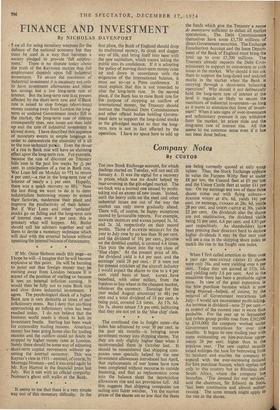Company Notes
By CUSTOS
THE new Stock Exchange account, for which dealings started on Tuesday, will not end till January 4. It was the signal for a recovery in prices, which was no doubt helped by bear-covering in the gilt-edged market. The set-back was a normal one caused by profit- taking and an excess of new issues. Indeed, until the heavy calls on the steel and other industrial issues are out of the way the market can only move gradually ahead. There will, of course, be happy exceptions caused by favourable reports. For example, HAWKER SIDDELEY and RANKS jumped 3s. 3d. and 2s. 3d. respectively on their record profits. Those of HAWKER SIDDELEY for the year to July rose by no less than 50 per cent. and the dividend of 101 per cent., payable on the doubled capital, is covered 6.4 times. This puts the share into the top class of 'blue chips.' At the present price of 48s. the dividend yield is 4.4 per cent. and the earnings' yield 28 per cent. , If it were not for present criticism of the aircraft industry I would expect the shares to rise to a 4 per cent. yield basis at least. RANKS have benefited, with other millers, from the freedom to buy wheat in the cheapest market, whatever the currency. Earnings for the year ended August amounted to 481 per cent and a total dividend of 19 per cent. is being paid, covered 2.6 times. At 17s. 6d. the 5s. shares return 5.6 per cent. indicating that they are not yet in the blue chip' class.
• • •
The continued rise in freight rates—the index has advanced by over 30 per cent. in the past six months—is bringing more investment money into shipping shares. Yet they are only slightly higher than when I recommended them in October last. It should be remembered that shipping com- panies were specially helped by the new investment allowances introduced last April, that replacements of war losses have now been completed without recourse to outside financing, and that as replacements come into the balance sheet the depreciation allowances rise and tax provisions fall. All this suggests that shipping companies are sailing into fairer weather. Yet the market prices of the shares are so low that the fleets are being currently quoted at only scrap values. Thus, the Stock Exchange appears to value the Furness Withy fleet at under £8 per ton, the Cunard fleet at £9 per ton and the Union Castle fleet at under El 1 per ton. On my earnings test two of these three shares come out with flying colours- FURNESS WITHY at 45s. 6d. yields 141 per cent, on earnings, CUNARD at 28s. 6d. yields 28 per cent. and UNION CASTLE at 30s. yields 23 per cent. On dividends also the shares are not unattractive, the dividend yields being 51 per cent. 6.6 per cent. and 4.85 per cent respeCtively. As shareholders have been pressing their directors hard to declare higher dividends it may be that next year will see a rise in the shipping share index to match the rise in the freight rate index.
• • • When I first called attention to them over a year ago MERCANTILE CREDIT £1 shares were only 56s. and were yielding over 6 per cent. Today they are quoted at 132s. 6d. and yielding only 3.8 per cent. And in the meantime there has been a profitable rights issue. In view of the great expansion in the hire purchase business which is now being enjoyed—helped, of course, by the removal of Government restrictions last July-1 would not recommend profit-taking. An increase in dividend—now 25 per cent.-- in respect of the current year is more than probable. For the year up to September last (when group profits rose from £392,000 to £518,000) the company worked under Government restrictions for over nine months. It began its new trading year with sums outstanding on hire-purchase agree- meats 26 per cent, higher than in the previous year. The new capital recently raised enlarges the base for -borrowing front its bankers and enables the company to expand with the ever-increasing demand for hire purchase finance, which applies not only to this country but to Rhodesia and South Africa, where the company ha! branches. 'The demand for our services, said the chairman, Sir Edward de Stein. 'has been continuous and almost embar- rassing.' The same remark might apply W the rise in the shares.


































 Previous page
Previous page